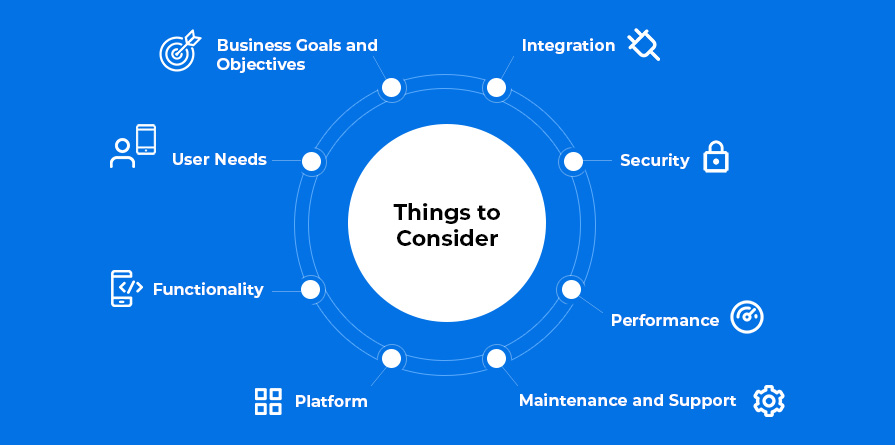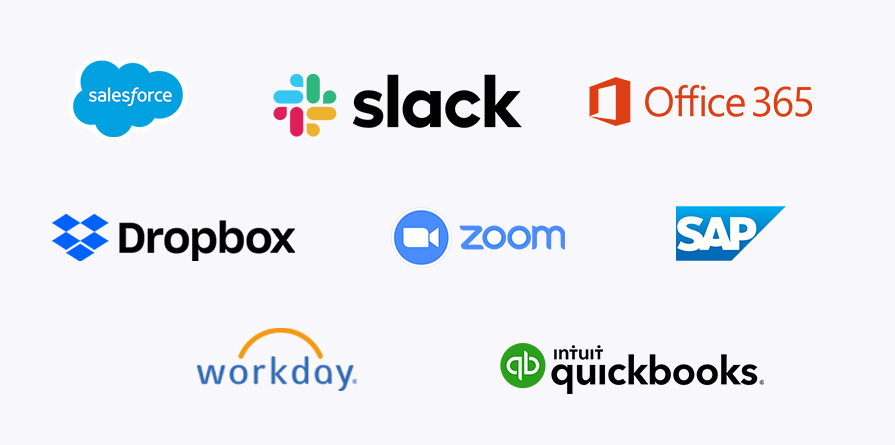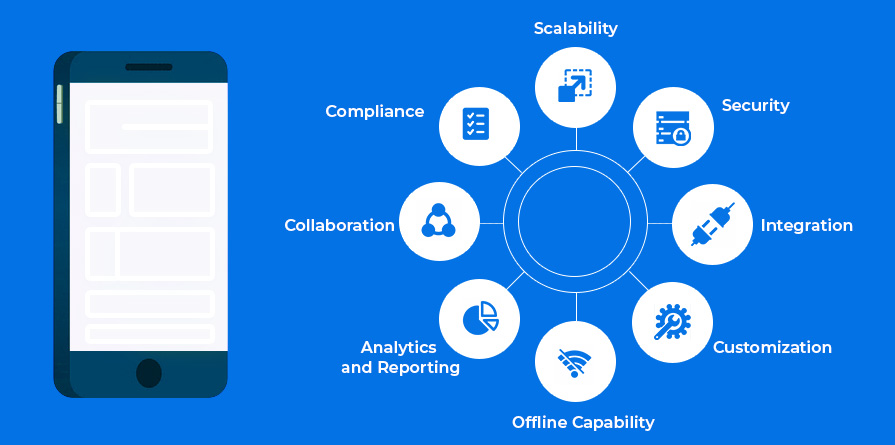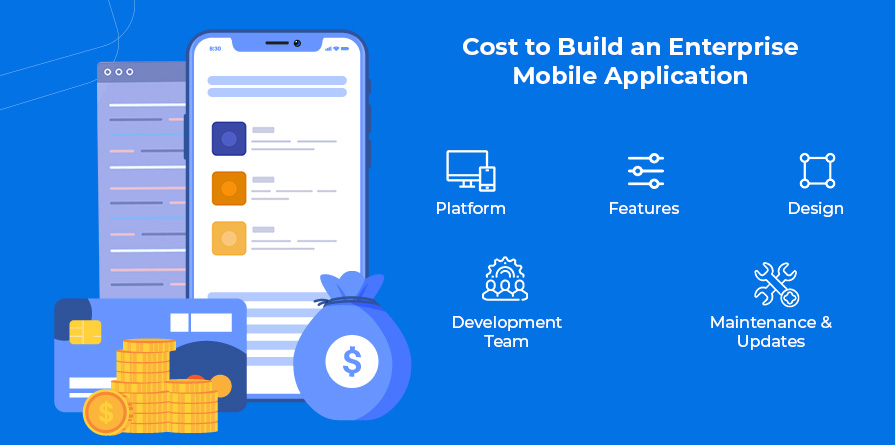How does enterprise App increase your business efficiency?
To stay ahead of the competition, companies must find ways to simplify processes, improve communication, and get the most work done.
The use of business apps is one way to reach these goals. Enterprise apps are apps that are made to fit the needs of a business and help it run more quickly and effectively.
These apps can be made to handle processes, give real-time data and information, and make it easier for team members to talk to each other and work together.
The Key important features and benefits of business apps, the different kinds of custom apps that can be made, and what to think about when making an enterprise mobile app.
We will also look at some of the most popular business apps on the market and talk about how much it costs to make an enterprise mobile app. By the end of this piece, you’ll know everything you need to know about how workplace apps can make your business run more smoothly and help it reach its goals.
Table of Contents
- What is enterprise app development
- Types of Custom Enterprise Applications
- How the development of enterprise applications helps your business grow
- Things to consider about when making an enterprise mobile app
- What are The Most Successful Enterprise Apps In The Market?
- Core Features of an Enterprise App
- Cost to Build an Enterprise Mobile Application?
- Wrapping Up
What is enterprise app development?
Developing software applications for use within large organizations or corporations is known as “enterprise app development.” These applications, which may be built in-house or outsourced to third-party programmers, are tailored to meet the unique needs of a business in areas like workflow management, transaction processing, inventory tracking, and staff communication.
Aesthetics and user experience are less of a priority in enterprise software development than functionality, security, and scalability. Gathering requirements, designing and prototyping, developing and testing, deploying, and providing ongoing maintenance and support are all common steps in the process.
If a company wants to increase productivity, simplify internal processes, and adapt to the dynamic requirements of the current market, then corporate app development is a crucial activity.
According to a report by Research and Markets, the global enterprise mobile application market is expected to grow at a CAGR of 11.2% from 2021 to 2026, driven by the increasing demand for enterprise apps that help improve productivity and streamline workflows.
According to a report by Salesforce, companies that use mobile apps report a 54% increase in productivity and a 39% increase in sales.
Types of Custom Enterprise Applications
The term “custom enterprise applications” refers to software programs tailored to the specific requirements of a certain company. These programs are created in-house or by contracted programmers to meet unique organizational needs. Typical examples of custom corporate software include:
- Customer Relationship Management (CRM) Applications: Sales, marketing, and support are just some of the areas that might benefit from customer relationship management software. These programs aid organizations in monitoring client activity, organizing customer information, and boosting customer happiness.
- Enterprise Resource Planning (ERP) Applications: ERP software was developed to streamline operational essentials including accounting, inventory management, and supply chain operations. These programs facilitate the simplification and enhancement of corporate processes.
- Human Resource Management (HRM) Applications: Human resource management software helps businesses keep track of important employee details including payroll, benefits, time off requests, and reviews. These programs aid firms in more efficiently managing their staff.
- Business Intelligence (BI) Applications: Analytics and insights into corporate performance are the main goals of business intelligence (BI) software. These programs facilitate better decision-making and enhanced operations inside enterprises.
- Collaboration and Communication Applications: The goal of collaboration and communication software is to facilitate better interaction and coordination amongst workers. Instant messaging, video conferencing, and software for managing projects are all examples of such applications.
- Supply Chain Management (SCM) Applications: The purpose of supply chain management (SCM) software is to coordinate the delivery of products and services from vendors to end users. These programs aid firms in optimizing their supply chains and increasing productivity.
- Content Management Systems (CMS): The primary purpose of content management system software is to facilitate the administration of various forms of digital media. These programs improve the efficiency with which enterprises may store, organize, and disseminate material.
The goal of a bespoke enterprise application is to fulfill the specific requirements of a certain company. These programs may help businesses function more effectively, simplify their processes, and get valuable insights into their operations.
Applications for customer relationship management, enterprise resource planning, human resources, business intelligence, collaboration and communication, supply chain management, and content management systems are among the most often developed forms of bespoke enterprise software.
How the development of enterprise applications helps your business grow
There are several ways in which the creation of enterprise apps might aid in a company’s expansion. Some of the many benefits that companies may get from investing in bespoke enterprise apps are as follows:
- Streamlining Business Processes: Custom enterprise software may be modified to fit any organization’s unique requirements. Applications like this may help businesses save time and money by automating and streamlining tasks like inventory management, order processing, and customer support.
- Improved Decision Making: Businesses can benefit from the information provided by custom enterprise apps in several ways. Better choices may be made in terms of resource allocation, marketing, and product development when organizations analyze data and spot trends.
- Better Collaboration: Tools for internal communication, project management, and file sharing are all made easier by custom corporate software. Businesses may boost output and cut down on mistakes by working together better.
- Enhanced Customer Experience: Enterprise software may be tailored to improve interactions with customers. For instance, a bespoke CRM software may provide organizations a bird’s eye perspective of their customers’ activity, letting them tailor their communications and deliver a higher level of service.
- Scalability: Custom business software may be made to adapt to the changing needs of the company. The software is easily upgraded and changed to accommodate the evolving needs of the company.
- Competitive Advantage: When a firm needs a unique solution to a problem, custom enterprise apps may give them a leg up on the competition. Businesses may set themselves apart from the competition and offer better customer service by tailoring applications to their unique requirements.
Improved productivity, operational insights, teamwork, customer satisfaction, and a market edge are just a few of the ways in which custom enterprise application development may aid in a company’s expansion. In order to thrive in today’s dynamic economic climate, companies need to prioritize developing their own enterprise apps.
Things to consider about when making an enterprise mobile app

Making an enterprise mobile app that is both effective and tailored to the specific needs of the business requires careful consideration of a number of factors. Here are a few things to keep in mind:
- Business Goals and Objectives: The organization’s aims and purposes should be reflected in the mobile app. Think about the goals of the app and how it fits in with the larger business plan.
- User Needs: Think about the people who will really be using the app. Make sure the software is simple to use, easy to understand, and appropriate for its intended audience.
- Functionality: Find out what the app needs in terms of features and functionality. Think about the functions the app will serve and the features it will need to provide for its users.
- Platform: Choose an operating system like iOS or Android on which to build the app. Think about the benefits and drawbacks of each platform and pick the one that will work best for your business.
- Integration: Find out how the app will work with the company’s current infrastructure. Think about the information that will need to be exchanged with other systems and the information that the app will require access to.
- Security: Maintain the safety of the app and its sensitive data. Think about the steps that will be taken to ensure that only authorized users may use the app.
- Performance: Make sure that everything about the app’s performance is as good as it can be. Think about how the app will scale as usage increases and how it will deal with a large influx of users.
- Maintenance and Support: Think about the long-term strategy for the app’s upkeep and support. Maintaining a successful app requires regular maintenance and upgrades, so make sure you have a plan for this and the means to carry it out or when you want to create an enterprise app then you should definitely work with highly reputed mobile app development companies only.
Business demands, user wants, features, platform, integration, security, performance, and support should all be taken into account while developing an enterprise mobile app.
By keeping these things in mind, businesses will be able to create mobile applications that are tailored to their specific requirements and help them achieve their goals.
What are The Most Successful Enterprise Apps In The Market

There are a plethora of popular business applications available, each with its own set of advantages. Some of the best business applications currently available are listed below.
- Salesforce: Salesforce is a CRM application that helps organizations keep track of their connections with customers. It offers several functions, from predicting sales to automating marketing to managing customer care.
- Slack: Slack is a messaging and collaboration platform where teams may interact in real time. It offers functionalities including real-time communication, document exchange, and project administration.
- Microsoft Office 365: Word, Excel, PowerPoint, and other Microsoft programs are all part of Microsoft’s Office 365 suite of productivity software. Users may make advantage of its document, spreadsheet, and presentation editing capabilities in addition to its email, calendar, and collaboration functions.
- Dropbox: Dropbox is a file-sharing and storage program that operates in the cloud. You can sync your files, work together with others, and access anything from your mobile device.
- Zoom: To put it simply, Zoom is a video conferencing program that facilitates online conferences and meetings. Features like screen recording, sharing, and virtual set pieces are all available.
- SAP: SAP stands for “Systems, Applications, and Products in Data Processing” and is an enterprise resource planning (ERP) software suite. Financial management, inventory control, and personnel administration are just some of the services it offers.
- Workday: Workday is a human resource management application that operates in the cloud. Features including staff monitoring, appraisal, and pay-roll processing are included.
- QuickBooks: Accounting software like QuickBooks is useful for companies of all sizes. It can help you with things like billing and accounting.
The success of these corporate applications can be attributed to the fact that they cater to the specific requirements of enterprises, offer helpful functions and resources, and boost efficiency and productivity.
Organizations may save time and money by using these applications to coordinate their efforts and communicate more effectively.
Core Features of an Enterprise App

Enterprise applications are tailored to the unique requirements of corporations and other establishments. Therefore, they typically have characteristics that set them apart from programs designed for general use. An enterprise app often has the following characteristics:
- Scalability: Enterprise applications must be extensible in order to keep up with the demands of expanding enterprises. As the company grows, they should be able to keep up with the demand from users and add new services without a hitch.
- Security: Data security is a top priority for enterprise apps. Data encryption, permission settings, and two-factor authentication are just few of the essential security measures that should be included.
- Integration: Integrating with pre existing infrastructure is essential for enterprise apps. They need to be able to easily access and exchange information with other systems.
- Customization: Enterprise software apps have to be flexible enough to be tailored to each individual business. They need to be modifiable so that firms may tailor the system to their own procedures.
- Offline Capability: In places with spotty or no internet service, business apps should still be fully functional. This makes sure that workers don’t have to take any breaks while they’re on the clock.
- Analytics and Reporting: The analytics and reporting tools of enterprise apps are essential for tracking usage and performance within an organization. Organizations may use this information to pinpoint problem areas and make educated decisions.
- Collaboration: Collaborative tools in enterprise apps facilitate knowledge sharing and teamwork between employees. Chat, file-sharing, and project management are all included in this category.
Compliance: Enterprise software should follow HIPAA and General Data Protection Regulation requirements, among others. They need to be developed in accordance with these standards and have characteristics that guarantee conformity.
Enterprise apps should be developed with the specific requirements of enterprises in mind. Scalability, security, personalization, compatibility with other systems, and useful functions like offline support, analytics and reporting, collaboration, and regulatory compliance are all must-haves.
Enterprise apps with these capabilities can improve a company’s productivity and speed up the process by which it reaches its objectives.
Cost to Build an Enterprise Mobile Application

Several variables influence how much it will cost to create an enterprise mobile app. These include the app’s complexity, the features it must have, and the platform it will be created for. An corporate mobile app’s final price tag might be affected by the following variables:
- Platform: The cost of creating an app might vary widely depending on the platform it is designed for. Generally speaking, the cost of designing an app for more than one platform, like iOS and Android, will be more than the cost of producing the app for a single platform.
- Features: The price of building an app might vary widely depending on its feature set. Adding features like offline access, system connections, and sophisticated analytics can increase the price of developing an app.
- Design: Whether or not custom designs are needed can have a significant influence on app costs. Users will be more interested in and likely to utilize an app if it is well-designed.
- Development Team: The size and experience level of the app development team might have an effect on the budget. The price of hiring a larger, more experienced team might go up, but the end product may be worth it.
- Maintenance and Updates: The total price tag might be affected by factors like the frequency of app updates and maintenance. Maintaining an app such that it stays relevant and useful to a company requires regular upkeep and updates.
When these variables are considered, the cost to build an enterprise mobile app might easily reach six figures. The best way to keep costs down while building an app is to choose a dependable development team and be specific about what you need.
Wrapping Up
Business productivity may be boosted by using enterprise applications to automate repetitive tasks, enhance teamwork, and get insights from data analytics.
Businesses may have software designed specifically for their operations by commissioning a custom enterprise application development service. Key elements of an enterprise app that help firms succeed include scalability, security, integration, customisation, offline functionality, analytics & reporting, collaboration, and compliance.
The investment in a well-designed and created app may pay off in higher productivity and enhanced performance, but the cost to construct an enterprise mobile application might vary based on a number of factors.
Enterprise applications already play a crucial role in the success of businesses, allowing them to respond quickly to shifting market conditions and remain ahead of the competition.
